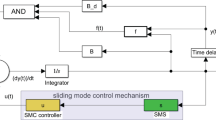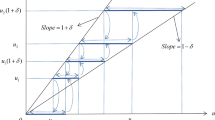Abstract
This paper proposes a novel robust finite-time tracking control scheme for robotic manipulators with uncertainties and external disturbances. In order to reduce the chattering phenomenon and enhance the robustness of the system, we design a novel extended state observer with filter function for estimating the lumped term of system uncertainties and external disturbances. We adopt the backstepping mechanism to design an adaptive backstepping nonsingular fast terminal sliding mode controller, achieve finite time convergence of the tracking errors while avoiding the singularity problem. An adaptive update law is designed for the switching gain, which further weakens the chattering problem. The finite-time convergence of tracking errors and the stability of the closed-loop system are ensured by the Lyapunov criterion. In comparison with other control methods, numerical simulation on a two-link rigid robot manipulator demonstrates the effectiveness and superiority of the proposed method.
Similar content being viewed by others
References
C. Hua, Y. Li, and X. Guan, “Finite/fixed-time stabilization for nonlinear interconnected systems with dead-zone input,” IEEE Transactions on Automatic Control, vol. 62, no. 5, pp. 2554–2560, 2016.
C.-C. Hua, K. Li, and X.-P. Guan, “Semi-global/global output consensus for nonlinear multiagent systems with time delays,” Automatica, vol. 103, pp. 480–489, 2019.
H. Wang, Y. Zhang, X. Chen, X. Tang, and I.-M. Chen, “On the disturbance rejection control of flexible-joint robot: A gpio-based approach,” International Journal of Control, Automation and Systems, vol. 19, pp. 2910–2920, 2021.
M. Rahmani, H. Komijani, and M. H. Rahman, “New sliding mode control of 2-dof robot manipulator based on extended grey wolf optimizer,” International Journal of Control, Automation and Systems, vol. 18, pp. 1572–1580, 2020.
F. Han and Y. Jia, “Sliding mode boundary control for a planar two-link rigid-flexible manipulator with input disturbances,” International Journal of Control, Automation and Systems, vol. 18, no. 2, pp. 351–362, 2020.
Z. Anjum and Y. Guo, “Finite time fractional-order adaptive backstepping fault tolerant control of robotic manipulator,” International Journal of Control, Automation and Systems, vol. 19, no. 1, pp. 301–310, 2021.
W. He, Y. Dong, and C. Sun, “Adaptive neural impedance control of a robotic manipulator with input saturation,” IEEE Transactions on Systems Man & Cybernetics Systems, vol. 46, no. 3, pp. 334–344, 2017.
A. H. Khan, S. Li, D. Chen, and L. Liao, “Tracking control of redundant mobile manipulator: An rnn based metaheuristic approach,” Neurocomputing, vol. 400, pp. 272–284, 2020.
H. Yang, Y. Yu, Y. Yuan, and X. Fan, “Back-stepping control of two-link flexible manipulator based on an extended state observer,” Advances in Space Research, vol. 56, no. 10, pp. 2312–2322, 2015.
L. Wang, Q. Shi, J. Liu, and D. Zhang, “Backstepping control of flexible joint manipulator based on hyperbolic tangent function with control input and rate constraints,” Asian Journal of Control, vol. 22, no. 3, pp. 1268–1279, 2020.
S. Chen, Z. Zhao, D. Zhu, C. Zhang, and H.-X. Li, “Adaptive robust control for a spatial flexible timoshenko manipulator subject to input dead-zone,” IEEE Transactions on Systems, Man, and Cybernetics: Systems, vol. 52, no. 3, pp. 1395–1404, 2022.
L. Celentano and M. V. Basin, “An approach to design robust tracking controllers for nonlinear uncertain systems,” IEEE Transactions on Systems Man & Cybernetics Systems, vol. 50, no. 8, pp. 3010–3023, 2020.
Y. Su and C. Zheng, “A new nonsingular integral terminal sliding mode control for robot manipulators,” International Journal of Systems Science, vol. 51, no. 8, pp. 1418–1428, 2020.
M. Van, X. P. Do, and M. Mavrovouniotis, “Self-tuning fuzzy pid-nonsingular fast terminal sliding mode control for robust fault tolerant control of robot manipulators,” ISA Transactions, vol. 96, pp. 60–68, 2020.
W. He, Y. Dong, and C. Sun, “Adaptive neural impedance control of a robotic manipulator with input saturation,” IEEE Transactions on Systems, Man, and Cybernetics: Systems, vol. 46, no. 3, pp. 334–344, 2016.
C. Li, F. Liu, Y. Wang, and M. Buss, “Concurrent learningbased adaptive control of an uncertain robot manipulator with guaranteed safety and performance,” IEEE Transactions on Systems, Man, and Cybernetics: Systems, vol. 52, no. 5, pp. 3299–3313, 2022.
S. P. Bhat and D. S. Bernstein, “Finite-time stability of homogeneous systems,” Proceedings of the 1997 American Control Conference, IEEE, vol. 4, pp. 2513–2514, 1997.
M. Van, S. S. Ge, and H. Ren, “Finite time fault tolerant control for robot manipulators using time delay estimation and continuous nonsingular fast terminal sliding mode control,” IEEE Transactions on Cybernetics, vol. 47, no. 7, pp. 1681–1693, 2017.
M.-D. Tran and H.-J. Kang, “Adaptive terminal sliding mode control of uncertain robotic manipulators based on local approximation of a dynamic system,” Neurocomputing, vol. 228, pp. 231–240, 2017.
L. Qiao and W. Zhang, “Adaptive non-singular integral terminal sliding mode tracking control for autonomous underwater vehicles,” IET Control Theory & Applications, vol. 11, no. 8, pp. 1293–1306, 2017.
X. Yu and M. Zhihong, “Fast terminal sliding-mode control design for nonlinear dynamical systems,” IEEE Transactions on Circuits and Systems I: Fundamental Theory and Applications, vol. 49, no. 2, pp. 261–264, 2002.
M. Jin, J. Lee, and K. K. Ahn, “Continuous nonsingular terminal sliding-mode control of shape memory alloy actuators using time delay estimation,” IEEE/ASME Transactions on Mechatronics, vol. 20, no. 2, pp. 899–909, 2014.
Y. Wang, L. Gu, Y. Xu, and X. Cao, “Practical tracking control of robot manipulators with continuous fractionalorder nonsingular terminal sliding mode,” IEEE Transactions on Industrial Electronics, vol. 63, no. 10, pp. 6194–6204, 2016.
J. Zheng, W. Hai, Z. Man, J. Jin, and M. Fu, “Robust motion control of a linear motor positioner using fast nonsingular terminal sliding mode,” IEEE/ASME Transactions on Mechatronics, vol. 20, no. 4, pp. 1743–1752, 2015.
M. Boukattaya, N. Mezghani, and T. Damak, “Adaptive nonsingular fast terminal sliding-mode control for the tracking problem of uncertain dynamical systems,” ISA Transactions, vol. 77, pp. 1–19, 2018.
T. Zhang and A. Zhang, “Robust finite-time tracking control for robotic manipulators with time delay estimation,” Mathematics, vol. 8, no. 2, p. 165, 2020.
Y. Zhang, X. Yang, P. Wei, and P. X. Liu, “Fractional-order adaptive non-singular fast terminal sliding mode control with time delay estimation for robotic manipulators,” IET Control Theory & Applications, vol. 14, no. 17, pp. 2556–2565, 2020.
J. Hu, Y. Cui, C. Lv, D. Chen, and H. Zhang, “Robust adaptive sliding mode control for discrete singular systems with randomly occurring mixed time-delays under uncertain occurrence probabilities,” International Journal of Systems Science, vol. 51, no. 6, pp. 987–1006, 2020.
S. Ahmed, H. Wang, and Y. Tian, “Adaptive fractional high-order terminal sliding mode control for nonlinear robotic manipulator under alternating loads,” Asian Journal of Control, vol. 23, no. 4, pp. 1900–1910, 2021.
Y. Zhu, J. Qiao, and L. Guo, “Adaptive sliding mode disturbance observer-based composite control with prescribed performance of space manipulators for target capturing,” IEEE Transactions on Industrial Electronics, vol. 66, no. 3, pp. 1973–1983, 2018.
M. Van and S. S. Ge, “Adaptive fuzzy integral sliding-mode control for robust fault-tolerant control of robot manipulators with disturbance observer,” IEEE Transactions on Fuzzy Systems, vol. 29, no. 5, pp. 1284–1296, 2020.
M. Van, M. Mavrovouniotis, and S. S. Ge, “An adaptive backstepping nonsingular fast terminal sliding mode control for robust fault tolerant control of robot manipulators,” IEEE Transactions on Systems, Man, and Cybernetics: Systems, vol. 49, no. 7, pp. 1448–1458, 2018.
Z. Zhao, X. He, and C. K. Ahn, “Boundary disturbance observer-based control of a vibrating single-link flexible manipulator,” IEEE Transactions on Systems, Man, and Cybernetics: Systems, vol. 51, no. 4, pp. 2382–2390, 2021.
L. Zhao, Q. Li, B. Liu, and H. Cheng, “Trajectory tracking control of a one degree of freedom manipulator based on a switched sliding mode controller with a novel extended state observer framework,” IEEE Transactions on Systems, Man, and Cybernetics: Systems, vol. 49, no. 6, pp. 1110–1118, 2017.
J. Qiang, L. Liu, M. Xu, and Y. Fang, “Fixed-time backstepping control based on adaptive super-twisting disturbance observers for a class of nonlinear systems,” International Journal of Control, pp. 1–13, 2021.
C. Ren, X. Li, X. Yang, and S. Ma, “Extended state observer-based sliding mode control of an omnidirectional mobile robot with friction compensation,” IEEE Transactions on Industrial Electronics, vol. 66, no. 12, pp. 9480–9489, 2019.
S. Yi and J. Zhai, “Adaptive second-order fast nonsingular terminal sliding mode control for robotic manipulators,” ISA Transactions, vol. 90, pp. 41–51, 2019.
S. Ding, J. H. Park, and C.-C. Chen, “Second-order sliding mode controller design with output constraint,” Automatica, vol. 112, p. 108704, 2020.
J.-J. E. Slotine and W. Li, Applied Nonlinear Control, vol. 199, no. 1, Prentice-Hall, 1991.
H. Yang, X. Fan, P. Shi, and C. Hua, “Nonlinear control for tracking and obstacle avoidance of a wheeled mobile robot with nonholonomic constraint,” IEEE Transactions on Control Systems Technology, vol. 24, no. 2, pp. 741–746, 2016.
J. Liu and X. Wang, Advanced Sliding Mode Control for Mechanical Systems, Springer, 2011.
Author information
Authors and Affiliations
Corresponding author
Additional information
This work is supported by the National Natural Scie nce Foundation of China (51765042, 61963062).
Zhenghong Xu received his B.E. degree in mineral process engineering from North China Institute of Science and Technology, Langfang, China, in 2018. Now, he is pursuing an M.E. degree in electric engineering at Nanchang University. His current research interests include sliding mode control and observers, and adaptive non-linear control of robotic manipulators.
Xiaohui Yang received his B.Sc. M.Sc., and Ph.D. degrees from Nanchang University, Nanchang, China, in 2003, 2006, and 2015, respectively. He has been with the Department of Electronic Information Engineering, School of Information Engineering, Nanchang University, since 2006, where he is currently a Professor. His current interests include intelligent control and stochastic non-linear systems etc.
Siyi Zhou received his M.E. degree in electric engineering from Nanchang University, Nanchang, China, in 2018. Now, he is working in the State Grid Hukou County Electric Power Supply Branch, Jiujiang Jiangxi, China. His research interests include sliding mode control and speed control of motor.
Wenjie Zhang received his B.E. degree in electrical engineering and automation from Heilongjiang University of Science and Technology, Heilongjiang, China, in 2019. Now, he is pursuing an M.E. degree in electric engineering at Nanchang University. His current research interests include sliding mode control and adaptive control of robotic manipulators.
Wei Zhang received his B.E. degree in electrical engineering and its automation from Nanchang University, Nanchang, China, in 2018. Now, he is pursuing an M.E. degree in electric engineering at Nanchang University. His current research interests include sliding mode control and adaptive control.
Shuang Yang received her B.E. degree in electrical engineering and its automation from Qingdao University of Science and Technology, China, in 2019. Now, she is pursuing an M.E. degree in electric engineering at Nanchang University. Her current research interests include power system optimization and adaptive control.
Peter Xiaoping Liu received his B.Sc. and M.Sc. degrees from Northern Jiaotong University, China, in 1992 and 1995, respectively, and a Ph.D. degree from the University of Alberta, Canada in 2002. He has been with the Department of Systems and Computer Engineering, Carleton University, Canada since July 2002 and he is currently a Professor and Canada Research Chair. His research interests include interactive networked systems and teleoperation, haptics, micro-manipulation, robotics, and intelligent systems. Dr. Liu is a licensed member of the Professional Engineers of Ontario (P.Eng), a senior member of IEEE and Fellow of Engineering Institute of Canada (FEIC).
Publisher’s Note
Springer Nature remains neutral with regard to jurisdictional claims in published maps and institutional affiliations.
Rights and permissions
About this article
Cite this article
Xu, Z., Yang, X., Zhou, S. et al. Extended State Observer Based Adaptive Backstepping Nonsingular Fast Terminal Sliding-mode Control for Robotic Manipulators with Uncertainties. Int. J. Control Autom. Syst. 20, 2972–2982 (2022). https://doi.org/10.1007/s12555-021-0559-1
Received:
Revised:
Accepted:
Published:
Issue Date:
DOI: https://doi.org/10.1007/s12555-021-0559-1




